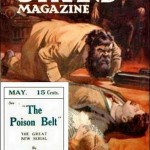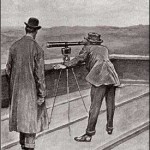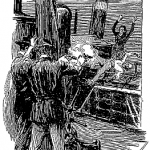“Make it fast aft then!”
The lad fastened the rope which held the dinghy to a stanchion beside the tiller. Then he and his father proceeded to hoist the foresail so as to get the boat’s head round.
“She’ll do now,” Sampson cried. “Give us a hand here, sir, if you don’t mind.”
Ezra caught hold of the rope which was handed him and pulled for some time. It was a relief to him to have something, however small, which would distract his mind from the events of the night.
“That will do, sir,” the skipper cried, and, leaning over the bows, he seized the anchor which Ezra had hauled up, and tumbled it with a crash on the deck.
“Now, Jarge, with three reefs in her we might give her the mains’le.”
With much pulling at ropes and with many strange nautical cries the father and the son, aided by their passengers, succeeded in raising the great brown sail. The little vessel lay over under the pressure of the wind until her lee bulwark was flush with the water, and the deck lay at such an angle that it was only by holding on to the weather rigging that the two gentlemen could retain their footing. The wild waves swirled and foamed round her bows, and beat at her quarter and beneath her counter, but the little boat rose gallantly to them, and shot away through the storm, running due eastward.
“It ain’t much of a cabin,” Sampson said apologetically. “Such as it is, you’ll find it down there.”
“Thank you,” answered Ezra; “we’ll stay on deck at present. When ought we to get to the Downs?”
“At this rate we’ll be there by to-morrow afternoon.”
“Thank you.”
The fisherman and his boy took turn and turn, one steering and the other keeping a look-out forward and trimming the sails. The two passengers crouched huddled together against the weather rail. They were each too occupied with thought to have time for speech. Suddenly, after passing Claxton and rounding the point, they came in full sight of the Priory, every window of which was blazing with light. They could see dark figures passing to and fro against the glare.
“Look there,” Girdlestone whispered.
“Ay, the police have not taken long,” his son answered. John Girdlestone was silent for some time. Then he suddenly dropped his face upon his hands, and sobbed hoarsely for the first and last time in his career.
“I am thinking of Monday in Fenchurch Street,” he said. “My God! is this the end of a life of hard work! Oh, my business, my business, that I built up myself! It will break my heart!”
And so through the long cold winter’s night they sat together while the boat ploughed its way down the English Channel. Who shall say what their thoughts were as they stared with pale, rigid faces into the darkness, while their minds, perhaps, peered even more cheerlessly into the dismal obscurity which lay over their future. Better be the lifeless wreck whom they have carried up to the Priory, than be torn as these men are torn, by the demons of fear and remorse and grief, and crushed down by the weight of a sin-stained and irrevocable past.





